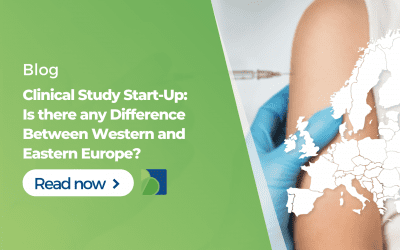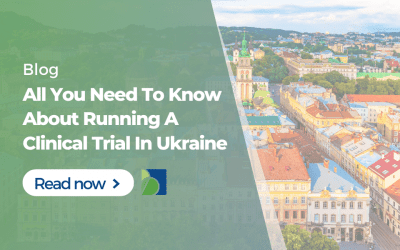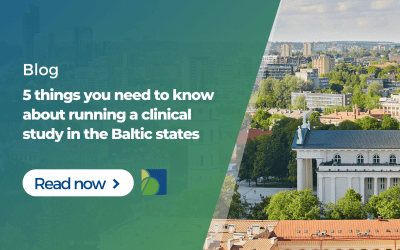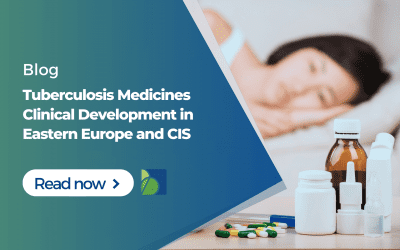
Moving Clinical Trials away from Ukraine and Russia
Russia, Ukraine, and other CIS countries have been significant contributors to clinical trials in many therapeutic areas for several years. With access to experienced investigators, good quality, and large patient populations, we could often improve timelines in clinical trials by including them in more studies. However, with the current situation, we can expect hindered trials (at least) in Russia and Ukraine and relocation to other parts of Europe for new trials in the foreseeable future.
The impact of imposed sanctions and challenging trial logistics is increasingly challenging. Although we can manage the overall impact on biotech because sales and manufacturing activities in Ukraine and Russia are limited, clinical trial sites in Ukraine are unlikely to remain operational given the conflict. The effect of the conflict on clinical trials could be far-reaching.
About Georgia
Georgia has approximately 3.7 million inhabitants and is considered an upper-middle-income country, and is comparable to so-called BRIC-countries like Russia, Brazil, and China. Over the past 20 years, these nations have developed strategies and policies to establish a favourable environment to conduct Clinical Trials there. They have established themselves as reliable destinations for pharmaceutical and medical device trials.
Economic reforms that have taken place since their independence in 1991 have led to a favourable economic climate, with high levels of economic freedom and ease of doing business. As a result, like other countries of the Commonwealth of Independent States (CIS), Georgia is host to many clinical trials. As of June 2022, the number of active clinical trials in Georgia is 79, which is relatively high for a country with less than 4 million inhabitants.
Healthcare system in Georgia
The Georgian healthcare system underwent a considerable rework from a system focused on targeted rewards to a system with publicly funded universal healthcare. As a result, there are many hospitals in Georgia, namely 256, 25 of which are in the capital Tbilisi.
Advantages Of Conducting Clinical Trials in Georgia
Georgia might not be the first country that comes to mind when considering countries to conduct clinical studies. However, there is plenty of reason to consider Georgia seriously.
- Clinical research in Georgia offers full compliance with ICH GCP guidelines.
- Clinical data is generally of high quality and is accepted by both FDA and EMA.
- Rapid approval process, which takes only two months to initiate
- Much lower costs of clinical research compared to the United States and Western Europe
- Wide variety of clinical areas, including heart and brain CNS diseases.
Local Regulations for Clinical Trials in Georgia.
Although Georgia follows ICH GCP guidelines, it is still good to be up-to-date with local regulations for clinical trials in Georgia. Since Georgia is an EU-associated country, it has similar required submission packages as EU countries. Key differences are that a Clinical Trial Application (CTA) form and Investigational Medicinal Product Dossier (IMPD) are not required. Instead, you should provide the Case Report Forms (CRFs), study protocol, and patient-related documents in the Georgian language. You may submit the Investigator’s Brochure (IB) in English.
National Competent Health Authority For Clinical Trials
The health authority governing Clinical Trials in Georgia is the LEPL regulation Agency for Medical and Pharmaceutical Activities. It falls under the Ministry of Internally Displaced Persons from Occupied Territories, Labour, Health and Social Affairs. The functions of the Agency are:
- admission of a pharmaceutical product to the Georgian market;
- selective control of a pharmaceutical product;
- maintenance of the departmental register and ensuring its publicity;
- issuing a permit for the export or import of a pharmaceutical product (other than narcotic drugs), a clinical trial of a pharmacological product, an authorized pharmacy, a pharmaceutical product under special control, and controlling the permit conditions;
- implementation of measures against counterfeiting of pharmaceutical products;
- Supervise the removal/destruction of a pharmaceutical product from the sales network, as required by the legislation of Georgia, maintain a register of distributors of pharmaceutical products and selectively control them;
- Issuance of a document certifying access to the Georgian market;
- Perform other functions defined by the legislation of Georgia.
The Georgian government has documented several terms and conditions that must be met for the issuance of a clinical trial permit. These include a list of documents that you must submit to the Agency for Medical and Pharmaceutical Activities.
These documents include:
- Clinical Trial Protocol (Protocol) – following Good Clinical Practice (GCP) standards;
- Pre-clinical research materials (may be submitted in English);
- Sample of the research subject information sheet and written informed consent (following the GCP guideline);
- A sample of the patient’s card (may be submitted in English, on paper or in electronic form)
- Proof of insurance for the duration of your clinical trial risk/liability clinical trial;
- In the case of pharmacological drug (s) intended for the treatment of progressive therapy, a pharmaceutical manufacturing permit or a GMP certification for the manufacture of a pharmacological drug by the manufacturer (permitted in English, original or printed from the official website) or regulated by the latter Certified copy of the report (Inspection Report).
Biomapas Nordic AB Appoints Ola Jeppsson to CEO & Business Development Director
August 2021 Ola Jeppsson has taken on a leading role as Business Development Director. In addition to his new role, he was appointed as a Chief Executive Officer at Biomapas Nordic AB starting August 2021.Having a management and business development background in the...
7 Reasons To Include Eastern Europe In Your Clinical Trial Strategy
Choosing the right set of countries, sites and investigators for a clinical trial are critical success factors in any clinical development program. They can guarantee speedy patient recruitment and timely delivery of study results. It also ensures that you conduct...
Clinical Study Start-Up: Is there any Difference Between Western and Eastern Europe?
This article reviews Clinical Study Start-up Differences Between West & East Europe, timelines, and processes. Medicine is constantly evolving to invent effective ways to treat diseases. This progress is a never-ending process: the life science industry develops...
Running a Clinical Trial in Ukraine
Despite the fact that Ukraine is the largest country in Eastern Europe with a large population of treatment-naïve patients, well organized public health care sector and significant number of medical sites accredited for clinical trial conduction, country has utilized only 15% of its current potential for hosting clinical trials. During 2017, the European Medicine Agency (EMA) gave positive recommendations on 94 new drug applications and 49 of them were tested in clinical trials in Ukraine. During the same year, the US FDA approved 151 new drugs, and 28 of them were also studied in Ukraine.
What You Need to Know about Running a Clinical Trial in Russia?
Russia is a very perspective country for international clinical trial conduction. The first international clinical trial was set up in Russia about 20 years ago only, and from than country kept a great potential for market development. In 2018 health authorities (HAs) approved 653 clinical trials (CT) in Russian Federation, less in overall numbers compared to the same indicator from 2016 – 898 approved CTs. However, this decrease was observed across all types of clinical trials except for international multicentre clinical trials (IMCT).
The CIS Region: Excellent Potential for Patient Recruitment but is there any Risk to Quality?
The number of clinical trials worldwide is increasing more than 10% each year due to the new diseases, further research for better health products and development of new drugs. Though, for a successful clinical trial, there is a major challenge – patient recruitment, which is essential and the most challenging factor due to the increasing number of new clinical trials. In order to achieve the required patient recruitment, sponsors are looking for different solutions.
Running a clinical trial in the Baltic states
In the past five years, an average of 175 clinical trials are being initiated in the Baltic states each year. An average of 64,8% of the population in the Baltic states are in the age from 15 to 65 years old, the main target audience for clinical trials. Furthermore, a large pool of treatment-naïve subjects is available compared to other EU countries or the US. Patients with special therapeutic diseases are transferred to the main central hospitals.
Remaining Vigilant and Compliant after Brexit: What’s next? (Latest Updates)
On 29th March 2017 UK submitted the notification of its intention to withdraw from the EU. This means that UK will become a ‘third country’ from 30th March’19. Even though leaving the EU with a deal remains the Government’s top priority, UK drug agency is publishing a series of guidance documents for industry and other stakeholders covering the proposed arrangements for the regulation of medicines, medical devices and clinical trials, if UK leaves EU with no deal.
Tuberculosis Medicines Clinical Development in Eastern Europe and CIS
World Tuberculosis Day is commemorated every year on 24th March to raise awareness of tuberculosis, which is still causing death of nearly 1.5 million people each year, mostly in developing countries. It marks the day in 1882, when Dr. Robert Koch announced that he had discovered the cause of tuberculosis, the TB bacillus. In comparison to other infectious diseases caused by a single infectious agent, tuberculosis is the second biggest killer worldwide.
AICROS Annual Meeting: insights and future perspectives
The Association of International Clinical Research Organizations (AICROS) is a network of small to mid-size CROs, which provide clinical research services to the pharmaceutical, biotech and medtech industries. Biomapas joined AICROS in 2014 and since then has been an active member of the association. On the 20-22 February, Biomapas’ CEO Audrius Sveikata participated in the AICROS Annual meeting, which took place in Tel Aviv, Israel. Audrius shared his insights about the meeting and the future perspectives of the association.


















